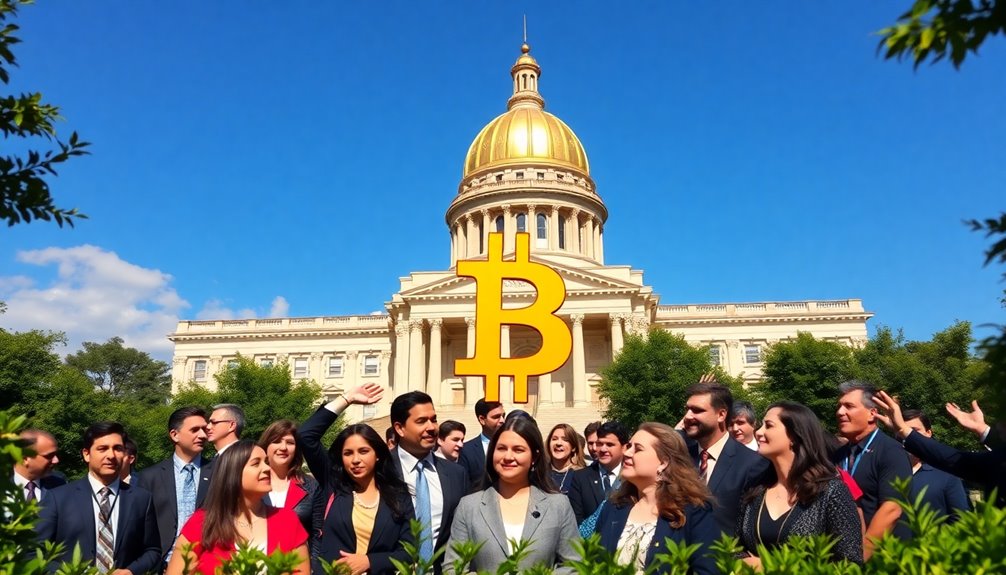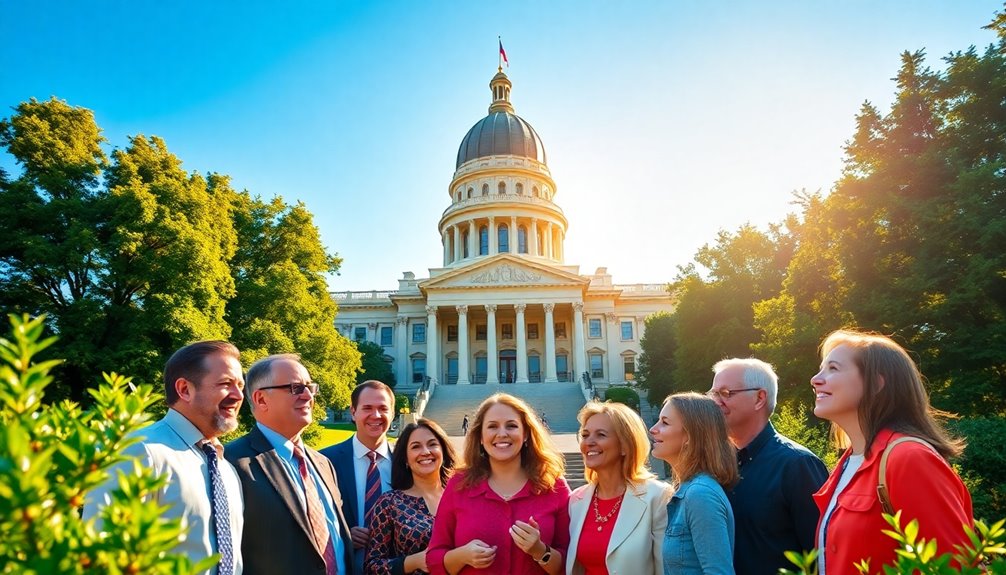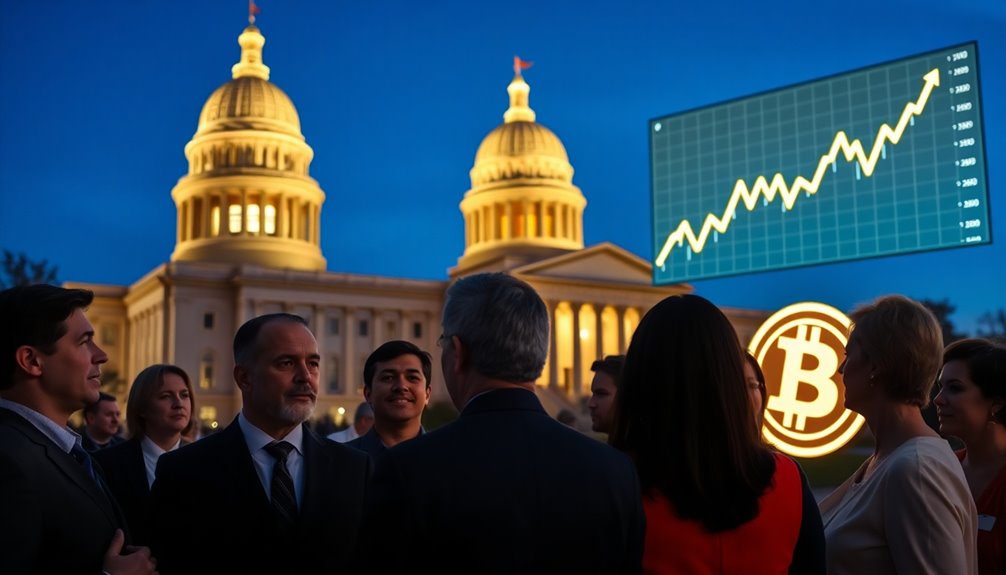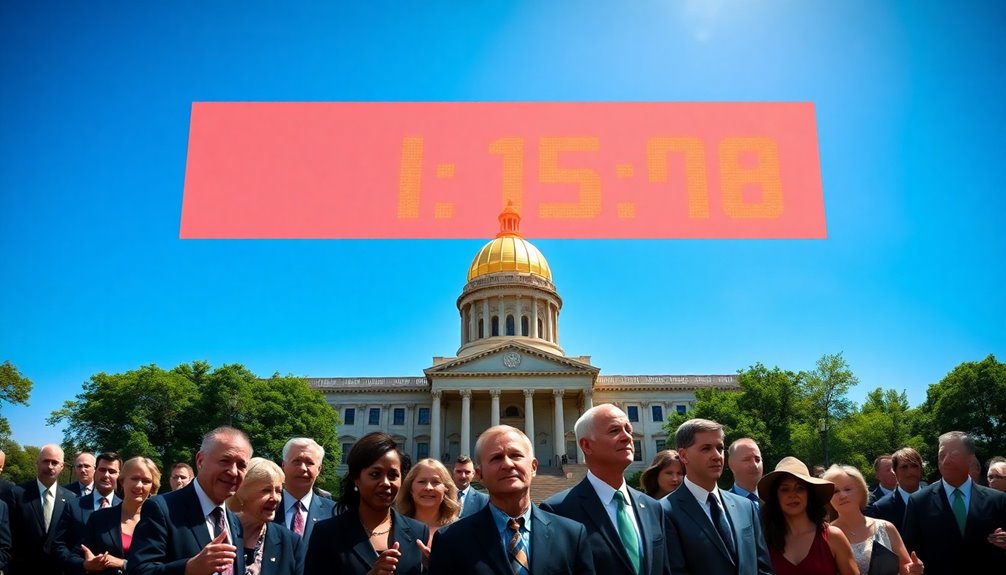Oklahoma’s proposed Bitcoin Reserve Act aims to strengthen state finances by allowing investments in Bitcoin and other digital assets. By implementing a cap of 10% on total fund value, it prioritizes financial prudence. This initiative is designed to hedge against inflation and protect purchasing power, positioning Oklahoma as a leader in digital asset adoption. The act includes advanced security measures and strict governance protocols, ensuring transparency and stability. With this strategic move, you’ll see how Oklahoma empowers communities and aligns with national trends in cryptocurrency acceptance, revealing a forward-thinking approach to fiscal policy. Furthermore, the Oklahoma Bitcoin Reserve Act is seen as a bold step toward modernizing state investment strategies, potentially attracting tech-savvy investors and innovative companies to the region. As more states begin to explore similar frameworks, Oklahoma bitcoin investment legislation could serve as a benchmark for others looking to navigate the complexities of digital currencies. This forward-looking approach not only enhances Oklahoma’s financial resilience but also fosters a culture of technological advancement and economic diversification within the state.
Key Takeaways
- The Bitcoin Reserve Act allows Oklahoma to invest up to 10% of state funds in Bitcoin and other eligible digital assets.
- It aims to hedge against inflation, thereby protecting the state's purchasing power and financial stability.
- The act requires investments to be in assets with a market cap of over $500 billion, ensuring financial prudence.
- Advanced custody solutions and multi-party governance protocols enhance security and transparency in managing digital assets.
- This initiative positions Oklahoma as a leader in digital asset adoption, aligning with national trends in cryptocurrency acceptance.
Overview of the Act

The Oklahoma Bitcoin Reserve Act aims to safeguard state finances by allowing a portion of state savings and pension funds to be invested in Bitcoin. This act serves as a hedge against inflation, recognizing Bitcoin's decentralized nature as a potential safeguard for financial stability. By generating reliable returns, the act intends to protect citizens' purchasing power from inflationary pressures. It aligns with strategies seen in the private sector, where asset managers like BlackRock and Fidelity use Bitcoin to mitigate macroeconomic risks. Furthermore, Oklahoma seeks to position itself as a leader in digital asset adoption, reflecting a broader national trend as other states explore similar initiatives. These measures could significantly influence public finance integration in Oklahoma. Additionally, Oklahoma becomes the sixth state to propose such legislation, demonstrating a growing momentum for Bitcoin as a reserve asset. Implementing this act could enhance portfolio diversification for state investments, thereby increasing resilience against economic fluctuations.
Key Features and Benefits

Oklahoma's Bitcoin Reserve Act introduces several key features that promise to enhance the state's financial landscape.
You'll find that the act allows investments in Bitcoin and other digital assets, provided they meet specific market cap criteria. Investments are capped at 10% of total fund value, ensuring financial prudence. Additionally, the proposed legislation has set a market cap requirement of over $500 billion for digital assets, ensuring only established cryptocurrencies are considered for investment. This aligns with the importance of risk assessment in mitigating potential financial exposure.
Security is prioritized through advanced custody solutions and strict governance protocols, ensuring state ownership of staked assets.
Additionally, taxes paid in Bitcoin convert to US dollars for stability and transparency.
By embracing these innovations, Oklahoma positions itself as a leader in digital asset management, potentially attracting investment and fostering economic growth. This forward-thinking approach could set a precedent for other states considering similar initiatives.
Financial Strategy and Vision

While many states grapple with traditional financial strategies, Oklahoma's Bitcoin Reserve Act outlines a bold vision for the future.
You'll see a diversification of state funds through investments in digital assets like Bitcoin, capped at 10% of total fund values. This strategy includes stablecoins and altcoins with significant market caps, ensuring prudent management by the State Treasurer.
By viewing Bitcoin as a hedge against inflation, your purchasing power stands to benefit. Additionally, this initiative aligns with OU Norman campus strategic plan aiming to enhance educational opportunities and financial literacy for its citizens.
Oklahoma aims to lead nationally in financial technology, aligning with innovative fiscal policies and President Trump's vision.
This initiative not only future-proofs the state's finances but also empowers you and your community with more financial options, marking a significant shift toward mainstream acceptance of digital assets.
Security and Governance Measures

As you explore the implications of the Bitcoin Reserve Act, you'll find that robust security and governance measures are central to its framework.
The act mandates advanced custody solutions, including geographically diversified data centers, to securely store digital assets. It establishes strict multi-party governance protocols to ensure secure asset management, allowing state retirement funds to invest through qualified custodians and regulated exchange-traded products. This initiative positions Oklahoma to join states like Pennsylvania and Texas that have implemented similar Bitcoin financial strategies.
For stablecoin investments, only those with regulatory approval and market capitalizations over $500 billion are eligible. The state retains ownership of all digital assets, ensuring control and secure management, especially during staking activities.
Compliance with these governance protocols is crucial for maintaining transparency and security in Oklahoma's financial strategy.
Broader Implications and Trends

The implementation of the Bitcoin Reserve Act highlights significant trends in the broader cryptocurrency landscape, reflecting a growing acceptance of digital assets across various levels of government.
As states like Oklahoma and Pennsylvania push for Bitcoin reserves, they're aligning with federal pro-crypto momentum, especially under the incoming Trump administration.
This shift illustrates a nationwide integration of cryptocurrencies into economic strategies and showcases an evolving understanding of digital assets as valid financial tools.
By diversifying state funds with Bitcoin, Oklahoma aims to bolster financial stability and hedge against inflation. This initiative to allow state savings and pension funds to invest in Bitcoin empowers businesses and individuals to explore innovative payment options, potentially setting a precedent for other states to embrace emerging technologies in their financial frameworks.
Frequently Asked Questions
How Will This Act Affect Oklahoma Taxpayers Directly?
This act directly affects you by potentially enhancing the financial security of Oklahoma taxpayers.
By allowing investments in Bitcoin and other digital assets, it aims to protect your purchasing power against inflation. You might benefit from a more diversified state investment portfolio, which could lead to improved returns.
Additionally, as the state embraces digital assets, you'll see Oklahoma positioned as a leader in financial innovation, ultimately benefiting you and your community.
What Are the Potential Risks of Investing in Bitcoin?
Investing in Bitcoin can feel like walking a tightrope without a safety net. You face transaction irreversibility, meaning once you send your coins, they're gone for good.
The technical complexity can trip you up if you're not careful with your private keys. Security risks loom like shadows, while illiquidity might leave you stranded when markets shift.
Plus, with little consumer protection, you could easily fall prey to deceptive practices. Stay vigilant!
Will There Be Public Input on the Bill's Implementation?
Yes, there'll definitely be public input on the bill's implementation.
You can participate in public hearings, submit written testimonies, and share your comments directly during these sessions.
Lawmakers may also hold community meetings to gather more feedback.
Engaging through online platforms or attending town hall meetings will give you a chance to voice your opinions.
Your input can influence potential amendments and ensure that diverse perspectives are considered in the legislative process.
How Will the Act Impact State Employees' Retirement Plans?
Did you know that over 60% of financial advisors recommend diversifying into digital assets?
By allowing state employees to invest part of their retirement funds in Bitcoin, the act enhances investment options and financial security.
You'll have the flexibility to receive benefits in Bitcoin, protecting your purchasing power against inflation.
Plus, this approach aims to stabilize returns, ultimately supporting a more robust financial future for you and your fellow employees.
Are There Any Penalties for Non-Compliance With the Act?
You'll find that the act doesn't explicitly outline any penalties for non-compliance.
While it emphasizes prudent management and aims to reinforce fiscal responsibility, it lacks defined consequences for failing to follow its provisions.
Without specified enforcement mechanisms, the act focuses more on strategic investment rather than punitive measures.
However, future amendments might address this gap, so staying updated on any changes is crucial for understanding potential repercussions.
Conclusion
As Oklahoma steps into the future with its Bitcoin Reserve Act, it juxtaposes traditional finance with cutting-edge cryptocurrency innovation. You're witnessing a bold move that could bolster state finances while challenging conventional norms. Imagine a world where digital assets not only coexist with cash but thrive alongside it. This act isn't just about numbers; it's a vision for resilience and adaptability in an ever-changing economic landscape. Will Oklahoma's gamble pay off, or will it spark a new financial revolution?









